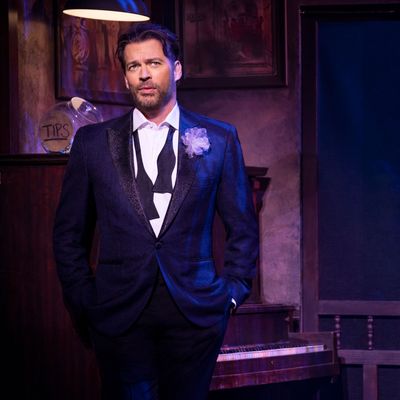
As the lights go down for the beginning of Harry Connick, Jr.: A Celebration of Cole Porter, the usual preshow announcement (shut off cell phones, etc.) carries a little extra kick. The voice asks us not to share any details of the show on social media, so as not to ruin the surprises for future audiences. Thats  odd. The Harry Potter plays urged audiences at intermission to Keep the Secrets, but Potter has a puzzle-and-magic plot. Connick is doing a revue of 70-year-old songs. Still, if you would like to stay unspoiled, then dont go past this sentence. He sings Anything Goes! Im sorry, Im sorry  I just thought you should know.
ItÔÇÖs the right weather for this sort of show ÔÇö we need an entertainment, a cozy throw, a weighted blanket, a warm dessert. ItÔÇÖs also the easiest decision youÔÇÖll ever need to make about where you put your leisure budget. Go have a listen to Connick on YouTube, singing PorterÔÇÖs ÔÇ£True LoveÔÇØ from High Society, something he does just this way in the show. Does the big-band arrangement, those trumpets punching right into your breastbone, do anything for you? Does ConnickÔÇÖs Louisiana rasp slow your heartbeat? Are you listening with your eyes closed? If so, snap decision. The rest of yÔÇÖall (yes, I will be drawling for the next 24 hours; thank you for your patience at this time) might think it sounds cheesy, and youÔÇÖll pass. Absolutely fine, absolutely your right. This show is unabashedly for an older, more conservative audience that will applaud when Connick talks about how ÔÇ£young songwritersÔÇØ are too explicit these days. Porter lyrics were more sensual because he just kind of hinted around, Connick says, and the crowd nods in shared pity for those benighted, unsexy youth. Feed this content to me with a spoon.
For the most part, the content is Cole. We hear ÔÇ£Begin the Beguine,ÔÇØ ÔÇ£Night and Day,ÔÇØ ÔÇ£Love for Sale,ÔÇØ all in ConnickÔÇÖs long, rich arrangements, full of his own jazz-piano breakdowns and showcase solos for the band. In only 90 minutes, heÔÇÖs not trying to race through the 800-song catalogue; he just wants to fall into the ones that feel most welcoming. Connick is good at what he does because of his ability to project ease. HeÔÇÖs two parts New Orleans melt, one part lounge-artist slink. He wears a tux like itÔÇÖs sweatpants. Even when he tap dances, heÔÇÖs the kind of hoofer who goes gentle on the floorÔÇöa drummer using brushes instead of sticks. When Harry is singing, Harry is playing piano, or Harry is watching his band and giving little grunts and punches of approval, that ease gets into you too. Cole Porter wrote luscious songs, and the Connick treatment ÔÇö he surprises us with syncopation but lulls us with timbre ÔÇö warms your spine like the nightÔÇÖs first slug of whiskey.
Admittedly, Connick is less deft with some other tasks he set himself for the show. He produces, writes, and directs as well, and ÔÇö oh boy. It gives me no pleasure to tell you that he starts things off with a long, weird, CGI-filled video, in which he climbs a huge statue of Cole Porter, enters it via his ear, and passes into a kind of limbo where he has a spiritual encounter with a piano. Later, he talks about the evening as an attempt to ÔÇ£get inside Cole PorterÔÇÖs head,ÔÇØ so you can sort of understand where the impulse came from. But other than an extremely brief biographical description (Porter was gay, paralyzed, and prolific, and died discontented), the man is left largely unexamined, and the video is just being bananas for no purpose. Connick has written some odd little scenes to couch the songs: He stands in a bedroom staring at a photo of his wife for one, and he and the upright bass player get run off by a cop in another. These are silly and awkward, and itÔÇÖs a physical relief when he stops acting and goes back to talking about the 25-piece band. He cannot sell the simple line ÔÇ£Oh, hello, Mark!ÔÇØ to virtuoso trumpeter Mark Braud. But heÔÇÖs smooth as whipped butter when he banters with conductor Andrew Fisher and praises concertmaster Louise Owen and tenor-sax maestro Jerry Weldon.
HeÔÇÖs written one quite wonderful sequence, though, in which he shows us how he arranged ÔÇ£Night and Day.ÔÇØ He walks us through the way that specific lyrics (a reference to a clock) make him choose instrumentation, and then, once heÔÇÖs chosen trumpets, how he decides between cup mutes and Harmon mutes. The projections show us how the notation changes, and the brass section behind him plays the heck out of the song in response. ItÔÇÖs still all about ease ÔÇö Connick tries singing the song in a couple of different keys, then chooses the one that ÔÇ£doesnÔÇÖt make him work that hard.ÔÇØ But oh, the veil is down. WeÔÇÖve seen the musicianship and care that all that relaxation requires, and it makes us melt a little further. WeÔÇÖre in such good hands, after all.
Harry Connick Jr: A Celebration of Cole Porter is at the Nederlander Theatre.


